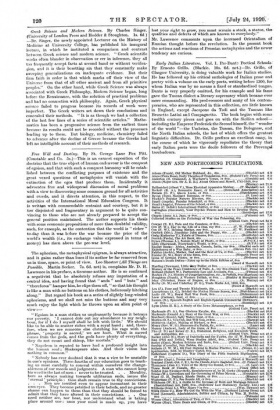The aphorism, the metaphysical epigram, is always attractive, and it
gains rather than loses if its author be far removed from us in time, space, or point of view. Leo Shestov (All Things are Possible. Martin Seeker. 7s. 6d. net) is, complains Mr. D. H. Lawrence in his preface, a tiresome author. He is so confirmed a negativist that he absolutely refuses any imputation of a central idea, and having found that " ands " and " buts " and "therefore?' hamper him, he clips them off, "so that his thought is like a man with no buttons on his clothes, ludicrously hitching along." But regard his book as a aeries of slightly long-winded aphorisms, and we shall not miss the buttons and may very much enjoy the light which he throws upon an alien point of view :— " Egoism in a man strikes us unpleasantly because it betrays our poverty. 'I cannot dole out my abundance to my neigh- bour, for if I do I myself shall be left with little.' We should like to be able to scatter riches with a royal hand ; and, there- fore, when we see someone else clutching his rags with the phrase, 'property is sacred,' we are hurt. What is sacred comes from the gods, and the gods have plenty of everything, they do not count and skimp, like mortals."
"Napoleon is reputed to have had a profound insight into the human soul ; Shakespeare also. And their vision has nothing in common."
"Nobody has ever doubted that it was a vice to be unstable in one's opinions. Three-fourths of our education goes to teach- ing us most carefully to conceal within ourselves the change- ableness of our moods and judgments. A man who cannot keep his word is the last of men : never to be trusted. . . Morality, here as always making towards utilitarian ends, issues the ' eternal ' principle : thou shalt remain true to thy convictions. • . . Men are terrified even to appear inconstant in their own eyes. They become petrified in their beliefs, and no greater shame can happen to them than that they should be forced to admit that they have altered in their convictions. . . One need neither see, nor hear, nor understand what is taking place around one : once your mind is made up, you have lost your right to grow, you must remain a stock, a statue, the qualities and defects of which are known to everybody."
Mr. Lawrence comments upon the increased Orientalism of Russian thought before the revolution. In the present book the actions and reactions of Prussian metaphysics and the newer tendency are curious.


































 Previous page
Previous page